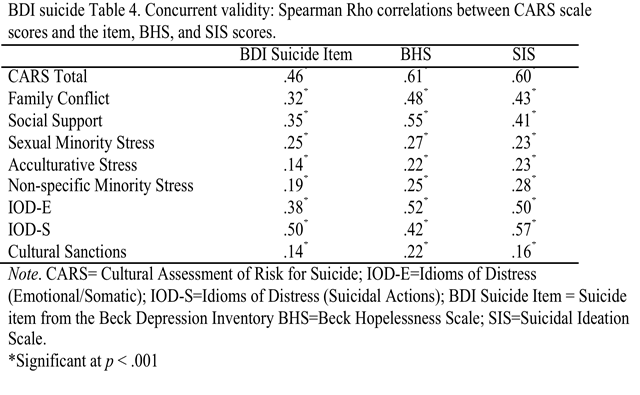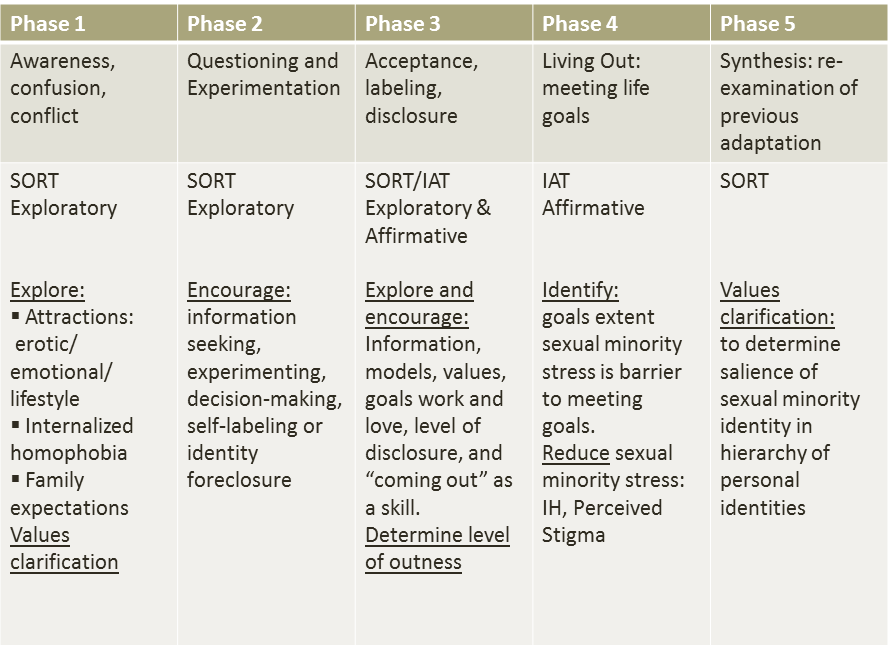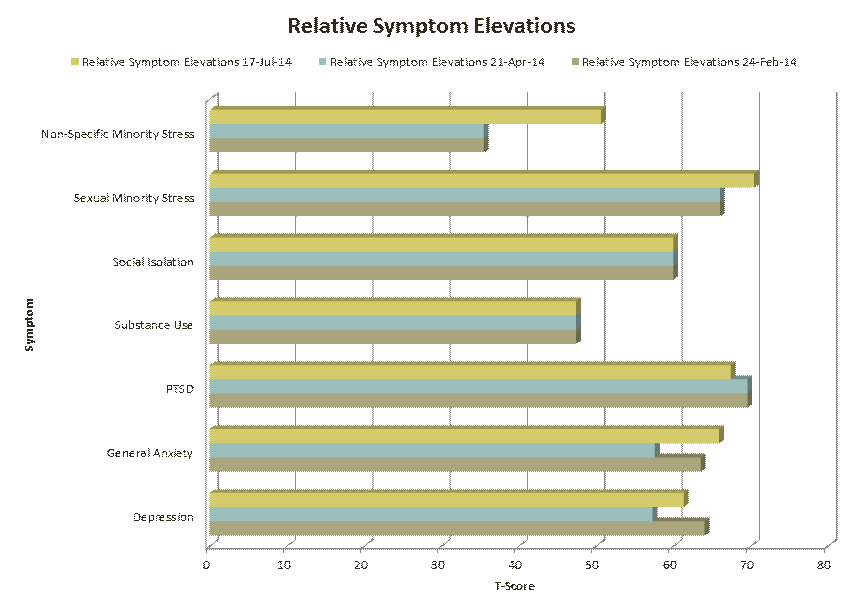Innerlife STS | Minority Stress
Incorporation of Minority Stress Scales Into Innerlife STS
The Center for LGBTQ Evidence-based Applied Researh (CLEAR) recently partnered with Innerlife STS to incorporate the CARS Minority Stress Scale into the Innerlife STS System. A description of this collaboration was presented at the 2014 APA annual convention in Washington DC. The scales were developed at The Gronowski Center, Palo Alto University, Palo Alto, California under the direction of the following primary investigators:
- Professor Peter Goldblum, Ph.D., Principal Investigator
- Professor Bruce Bongar, Ph. D.
- Professor Joyce Chu, Ph.D.
- Rebecca Floyd, Ph.D.
Minority Stress theory posits that chronically high levels of psychosocial demands placed on members of stigmatized minority groups requires an adaptation effort by them that exceeds that of non-stigmatized individuals. The negative psychological and physical impact of minority stressors, such as discrimination and prejudice, has been well documented among a variety of ethnic, sexual, and gender minorities. There are three subscales in the 12 item minority stress scale incorporated into the InnerLife : Sexual Minority Stress, Immigrant Stress, and Nonspecific Minority Stress. By identifying elevations in any of these subscales, clinicians determine the impact that these variables have on their clients’ clinical presentation, thus neither over-attributing nor under-attributing the impact that minority stress has on the etiology of clients’ problems. By combining information from these scales with others within the InnerLife, a comprehensive psychosocial assessment of minority clients can address the full range of their clinical needs.
The Minority Stress Subscales are:
Sexual Minority Stress: Client experiences distress related to being a member of a sexual minority group (lesbian, gay, bisexual, transgender, questioning). This distress may be evidenced as a need to conceal their sexual identity, the perception that they will be rejected by others who know that they are a sexual minority, have internalized negative stereotypes toward other sexual minorities or themselves for being a sexual minority, or have lower self esteem due to a history of negative events based on being perceived as a sexual minority.
Acculturative Stress: Client who was not born in America (or whose parents immigrated) experiences distress and confusion related to feeling like an outsider and not being familiar with American cultural norms.
Non-specific Minority Stress: Client who meets either or both criteria of sexual or ethnic minority feels general distress related to being a member of a minority group, they may internalize stigma related to their referent group, may wish to not draw attention to themselves, have poor self esteem related to minority status, and perceive the world to be a dangerous place
The Innerlife STS System is a cloud-based platform for Treatment Reports, Analytics, Outcome Tracking, and Documentation for mental health care. Innerlife STS creates and composes conceptualized narratives and builds them into professional-grade reports. These reports are designed for use by primary care physicians, mental health clinicians, and justice system professionals and include Mental Health Assessment Reports, Mental Health Treatment Reports, and Forensic Evaluation Reports.
Sexual Minority Stress (SMS) and LGBTQ Affirmative Approaches:
The cornerstone of LGBTQ Affirmative approaches is that the stress of living in a hostile environment places additional burden on sexual minorities: Lesbians, gay men, bisexuals, transgender, and those questioning their sexual identity. There are four components of Sexual Minority Stress:- Homonegativity: the internalized negative attitudes and beliefs toward other sexual minority individuals or community.
- Internalized Stigma: the expectation of negative reaction from members of the majority community
- Concealment of sexual identity
- Minority stress events: rejection, discrimination, bullying, and violence
Given the strong history of discrimination in the military and society as a whole, LGBTQ Clients may use a series of tests to determine whether it is safe to discuss their sexual or gender identity issues with clinician.
- Initially hide their sexual orientation and will undertake a series of “tests” before they will disclose their orientation
- Stick to safer subjects, not discuss worries or concerns that might put being LGBTQ in bad light
- May test to determine the extent of your acceptance: use sexually explicit images
Assessment of LGB clients must include the following:
- Full Assessment of all aspects of clients life, not only LGB issues
- Balance over- and under- attributing client problems to issues related to their sexual identity
- Understand client within cultural and social context, homonegativity and LGB community conformity, intersection with other identities
- Determine whether sexual minority stress should be a focus of the treatment
A Proposed Development of an Integrated Assessment for LGB Service Members in the Military
In a panel at the 2014 APA Convention in Washington DC, preliminary results from the survey for LGB Service Members were presented. In this panel, Dr. Goldblum encouraged the military to develop an integrated assessment program that includes the minority stress scales similar to the Innerlife STS System. he primary investigators were Kimberly Balsam, & Peter Goldblum, Palo Alto University and Capt. Scott Johnston, NCCOSC
General Measures of Stress and Distress- Couples Satisfaction Index
- Life Events Checklist (Traumatic Events)
- PTSD Checklist
- Alcohol Uses Disorder Identification Test (AUDIT)
- Generalized Anxiety Disorder
- Response to Stressful Experiences Scale
- Patient Health Questionnaire
- Perceived Stress Scale (PSS-4)
- Perceived Discrimination
- Combat Experiences Scale (CES)
- Post-Battle Experiences Scale
- Barriers to Care Questionnaire (Military and LGB)
- Willingness of LGB service member to seek mental health service
- Barriers for LGB and their families, partners, and children to seek mental health from military
- Outness Inventory—degree of disclosure of sexual identity, also degree of satisfaction with Outness
- Perceived Stigma—stigmatized minority expectation of rejection
- Internalized Homophobia—the degree to which respondent or devalues or values their LGB identity Minority
- CARS Minority Stress Scale—12 item scale that can be used as a screener that contains 3 subscales: sexual minority stress, nonspecific minority stress, and immigrant minority stress
- A 12-item screener to identify clinical levels of minority stress
- 3 factor component
- Sexual Minority Stress
- Acculturative Stress
- Non-specific Minority Stress
- All three subscales and Total CMSS were significantly associated with hopelessness, depression, past suicide attempts, and current suicide ideation.
- The largest differences were found between sexual minority stress and heterosexual status, with the greatest effect size occurring on the total CMSS and its Sexual Minority Stress scale.
- CMSS and its subscales were a greater predictor of psychological distress than ethnic or sexual minority status alone.
- Score Interpretation is provided to aid clinicians to identify individuals exhibiting clinically significant levels of MS, noting that > 1 SD and > 2 SD are association with different odds ratios for distress (we have set > 1SD Moderate; > 2SD Severe.
Connect with Innerlife STS on Linked-in by clicking on our logo below.

Chu, J.P., Floyd, R., Diep, H., Pardo, S., Goldblum, P., & Bongar, B. (2013). A tool for the culturally competent assessment of suicide: The Cultural Assessment of Risk for Suicide (CARS) measure. Psychological Assessment. Advance online publication doI: 10.1037/a0031264.


Integrating LGBT and Military Stressors: A Case Example
Betsey is a thirty something year old veteran who was discharged from the service after she announced that that she was male to female trans gender. As a consequence of her military service, Betsey has PTSD, including intrusive memories and activation at loud noises. She avoids most social situations, except those connected to her trans community. She has taken the Innerlife Assessment three times. The following graph provides a view that takes into consideration both her psychiatric symptoms, social isolation, and her minority stress. Treatment decisions were based on this integrated assessment.
Five-Phase Critical Treatment of Sexual and Gender Minority Client

Innerlife STS is committed to the success of professional clinicians and we invite all professional clinicians to connect with us on Linked-in by clicking on our logo below.



